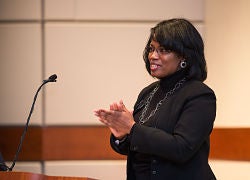10th Jean Mills Health Symposium focuses on building better health
Building a road and building better health care require a community to work together.
That was the message from keynote speaker Dr. Lori Carter-Edwards at the 10th annual Jean Mills Health Symposium held Feb. 7 at East Carolina University.
Using a road-building project in three towns to illustrate her point, Carter-Edwards said the only community that was successful had engaged stakeholders – from the ditch-diggers to the landowner – to get their road built on time with limited resources. They gathered information, relied on the skills of those involved and shared with each other.

Dr. Lori Carter-Edwards, deputy director for research and operations at the UNC Center for Health Promotion and Disease Prevention and research associate professor of health behavior at the UNC Gillings School of Global Public Health, was keynote speaker at the 10th Jean Mills Health Symposium. Photo by Cliff Hollis.
“Let’s look at what’s working and replicate it in our communities,” said Carter-Edwards, deputy director for research and operations at the UNC Center for Health Promotion and Disease Prevention and research associate professor of health behavior at the UNC Gillings School of Global Public Health.
Achieving health equity, or the same quality care for all, will require using the principles of community engagement to care for an aging – and changing – population, she said.
North Carolina’s public school system saw a net increase of 60 percent more Latinos and 32 percent more black students enrolled from 2000 to 2009. In Tier 1 counties, many of which are in rural eastern North Carolina, 84 percent of the population was listed as non-white and 51.5 percent was Hispanic.
While construction and manufacturing jobs continue to shrink in rural counties, one growth area has been health care because of an aging population with chronic health conditions.
Health care in the next decade will need to focus on four key areas, Carter-Edwards said:
- More options for where people get care. Besides hospitals and clinics, people will be treated in mobile units and other non-traditional settings like recreation centers, churches or schools.
- More diversity in health care teams
- Increased attention to preventing illness and disease.
- Adding collaborative, integrated care networks with non-traditional partners. “Research projects need to include the people we’re serving,” Carter-Edwards said. “Are you ready to sit at the table with the person you’re claiming to help?”
Landon Allen of Wake Forest is a third-year ECU medical/master’s of public health student and director of the Grimesland Free Clinic. He found Carter-Edwards’ presentation translatable. “It’s great advice,” he said. “It’s difficult to navigate, but the more we talk about it, we begin pulling groups together in a social movement to make these sorts of changes.”
Helen Hill has attended every Mills Symposium since at least 2008.
“It’s been a real advantage. Having the connection, listening to all the speakers they’ve brought in through the years and the different areas. It’s helped me,” said Hill, who retired as director of a school-based program with Greene County Health Care after more than 25 years. She began working part-time in Greene, Pitt and Pamlico counties last summer on another project.
Jean Elaine Mills, the symposium’s namesake, was a Greenville native and ECU alumna who died at age 45 of breast cancer in 2000.
Her brother, Amos T. Mills III, and his family started the symposium as a tribute and to bring awareness and solutions for health problems such as high blood pressure, stroke, hypertension, diabetes and obesity that plague North Carolinians, particularly African-Americans and other minorities.
“We made a commitment to make a difference in the life of eastern North Carolinians,” Mills said.
The only minority rural health care symposium of its kind in eastern North Carolina, the event has grown each year, from 50 participants in 2004 to about 175 last year.
The symposium was presented by the College of Allied Health Sciences in collaboration with the ECU Medical & Health Sciences Foundation. A broadcast of the symposium will be available online at http://www.ecu.edu/ah and ECU’s TV station Channel 99.